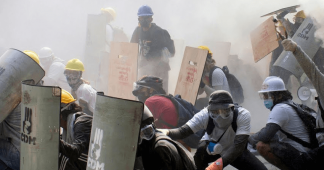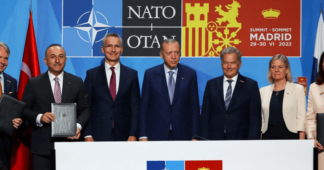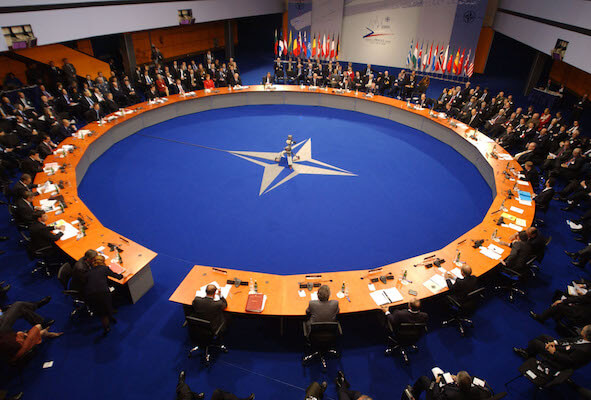In Madrid, people take to the streets to protest against the Western military alliance
Posted on
NATO is definitely starting to look unpopular in Europe. Despite pressure on the part of hegemonic media for the entire western hemisphere to obey the anti-Russian paranoia encouraged by the US, the problems that this type of mentality brings to the European people are already becoming evident, leading citizens to express their indignation in protests. In Madrid, groups have taken to the streets to demand an end to NATO’s bellicose actions. And, obviously, the hegemonic media omits to report the case.
This last week of June, NATO leaders will meet in the Spanish capital to draw up new plans of action against what are currently considered the West’s greatest enemies: Moscow and Beijing. The aim of the summit is to outline an efficient “strategic concept” to deal with the alleged “threats” to the West arising from the Russian intervention in the Ukrainian conflict. However, the event will not take place so peacefully, considering that the local population is outraged with the current situation of Europe in the plans of the US-led alliance.
On Sunday, June 26, thousands of people gathered along the Madrid’s Paseo del Prado Boulevard holding Spanish flags and chanting “NO NATO” and “NATO Bases – Out”. The protests were multi-party, including among the demonstrators people who were members of the Labor Party, the Communist Party, the United Left and the “Unidas Podemos”, a party with a moderate and social democratic orientation. In addition, many non-party organizations supported the protests, such as the Solidariedad Obrera union. Ideologically, leftists, democrats, pacifists and illiberal nationalists came together for a common cause: to make Spain abdicate from participating in NATO’s war plans.
An interesting detail of the Sunday protests was their international aspect. The individuals and organizations involved in the demonstrations were not only Spanish. There were also people from other countries demanding the same objective. For example, representatives of the Communist Party of Greece supported the protests, showing how indignation with NATO is a common attitude among European peoples. More than that, the event was also supported by members of the South Korean community in Spain, who took the opportunity to denounce the Western alliance’s ambitions in the Asia-Pacific region. There are images circulating on the internet showing banners written with “Disband NATO, a vehicle of imperialist war!” and “Oppose South Korea Joining NATO!”.
As expected, the state tried to use police force in order to prevent the right to demonstrate. Activists said that there was a higher-than-normal police presence on the streets of Madrid, with surveillance at the entrances to metro stations and other strategic points. There are reports of intimidation and violence by the police, despite the protests being peaceful.
It is also curious to note that the western media is not properly reporting the case. The protests, when not absolutely ignored, have been reported in a non-detailed way, omitting important aspects such as their multi-party and international character. Obviously, it is not in the interest of Western media outlets to show how unpopular NATO’s plans are among the citizens of the member countries themselves.
When commenting on the case, Spanish Defense Minister Margarita Robles denied the extraordinary scale of the event and rejected the impact of the protests, claiming that the protesters were a “clear minority”. The minister also highlighted the “importance” of Madrid hosting the summit, pointing to a kind of strategic value for Spanish interests in serving as a host for the alliance at such a delicate moment.
In fact, hosting relevant events is always a way to increase diplomatic prestige and elevate the international status of a country. The problem is when the event is focused on operating activities that do not match the strategic interests of the host country. In the Spanish case, this is precisely what happens. Spain has already problems to be faced, such as, for example, the tensions around the migratory crisis on the border with Algeria, which recently left dozens of dead by the authorities of both countries. There are many priority issues to be resolved before making the country participate in the war plans of a Washington-led alliance.
In addition, all over Europe, citizens are already directly suffering the impacts of the anti-Russian policy that the European bloc decided to adopt due to American pressure. People seem to realize more quickly than the decision makers that NATO does not interest Europe – and that is why the tendency is for the protests to become bigger and more expressive in the coming times.
As democratic governments, European countries should attend more to the claims of their own citizens than to foreign pressure. It is not in Europe’s interest to participate in NATO’s war plans – and it is not in Spain’s interest to serve as a stage for the announcement of measures that will harm itself.
* Lucas Leiroz is a researcher in Social Sciences at the Rural Federal University of Rio de Janeiro and geopolitical consultant. You can follow Lucas on Twitter.
We remind our readers that publication of articles on our site does not mean that we agree with what is written. Our policy is to publish anything which we consider of interest, so as to assist our readers in forming their opinions. Sometimes we even publish articles with which we totally disagree, since we believe it is important for our readers to be informed on as wide a spectrum of views as possible.











